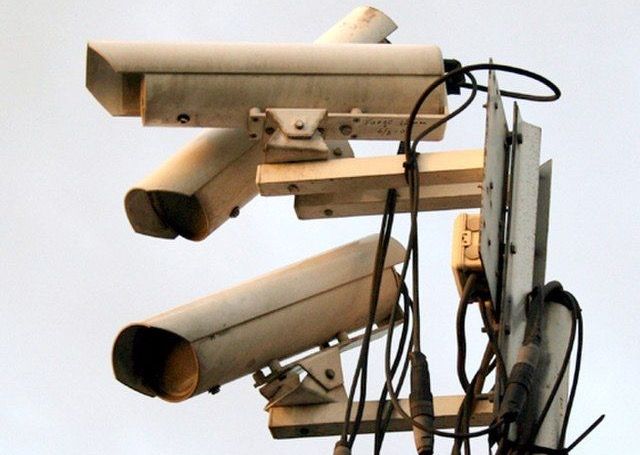China Says NSA Surveillance Is Intensifying
As Uncle Ben once said, with great power competition comes great espionage expansions. PLUS: Egypt buys a senator; and more!

As Uncle Ben once said, with great power competition comes great espionage expansions. PLUS: Egypt buys a senator; and more!
Edited by Sam Thielman
NORMALLY, I WOULDN'T do a FOREVER WARS edition like the one you're about to read—one that highlights questions rather than pursues answers, particularly about international surveillance.
But the fact of the matter is that this week I'm not going to have the time to do more than that. Yesterday was Yom Kippur. Today my oldest is home sick from school with a cold that kept her from getting enough sleep. This evening I'm going to get a COVID booster and a flu shot, so I expect to be laid out for much of tomorrow. Late on Thursday I'm going to fly to Qatar for a conference I mentioned, and before I leave I've got to prepare my remarks. Since I'm already feeling like the slate of items I had lined up for this edition might be approaching perishability, I figure the best of bad scheduling options will be to have this one highlight stuff rather than dive as deeply into them as I would otherwise like. Just leveling with you here.
Now, for paid subscribers, I've got a new Nation column set for imminent publication, and it's a reported column about the 9/11 museum. So no matter what, paid subscribers will see a proper FOREVER WARS edition back on track by next week. (I don't know when exactly The Nation will run my column, and I doubt I'll have the metaphorical bandwidth to get you the column from Qatar should it drop over the weekend.) Why not subscribe?
NOW, WITH all that out of the way... Last week, the Chinese government confirmed something Edward Snowden's leaks a decade ago revealed: the National Security Agency successfully backdoored its way into Chinese telecom giant Huawei. China's admission came while it reiterated recent accusations, largely ignored in American media, that NSA surveillance on China is intensifying. That's all an expected adjunct of "great power competition."
A persistent concern in national-security circles beginning in the early 2010s has been that Huawei is a stalking horse for People's Liberation Army (PLA) surveillance. Huawei's founder Ren Zhengfei is former PLA, and so his transition into telecom is immediately reminiscent of how portions of Israel's cybersecurity enterprise emerge from Unit 8200—the Israeli surveillance enterprise—or, for that matter, how NSA veterans have become huge players in private U.S. cybersecurity/tech. The U.S. security apparatus and its aligned elected officials have long feared that permitting Huawei access to U.S. markets will result in American data getting siphoned to PLA servers. There isn't "publicly provided evidence that this has happened," as the Council on Foreign Relations puts it. But fear and the interests of great-power competition have been enough for the U.S. to functionally bar Huawei from the U.S. telecom market through steps taken by both the Trump and Biden administrations.
There is, however, evidence that the NSA backdoored Huawei. Snowden's documents revealed that the NSA "could roam through [Huawei] computer and telephone networks to conduct surveillance and, if ordered by the president, offensive cyberoperations," as The New York Times reported when it and Der Spiegel broke the story. The NSA program, called SHOTGIANT, was ironically predicated on determining any linkages between Huawei and the PLA. It seems significant that the documents, per the Times, indicated that after more than two years of the NSA's extraordinary surreptitious access to Huawei, it hadn't found those PLA ties. The raw fact of the matter was that, Spider-Man-pointing-at-Spider-Man-style, the U.S. was accusing Huawei of potentially doing what the U.S. actually had already done.
State-on-state surveillance is one thing, and certainly all in the espionage game. But this doesn't stay confined to the US and Chinese surveillance agencies. However tailored access into Huawei actually was, it means potential access to Huawei's absolutely enormous user base, in China and abroad. Relatedly, SHOTGIANT had the additional benefit of being able to siphon data from Huawei-dependent networks that China constructed globally—all while Huawei has been in competition with American telecoms for access to foreign markets. The Snowden documents indicate NSA interest in "high priority targets" that were Huawei customers, like "Iran, Afghanistan, Pakistan, Kenya and Cuba." As with much of the current "great power competition," it's difficult to draw sharp distinctions between U.S. geoeconomic interests and U.S. security concerns.
So last week, China decided to confirm SHOTGIANT had been successful at forcing access into Huawei. It built upon claims has China made for the past year that the NSA has "stolen over 140 gigabytes of high-value data" through successfully forcing access and data extraction from "tens of thousands" of devices; and penetrated the aerospace-sector-tied Northwestern Polytechnical University. And earlier this month, shortly before the SHOTGIANT confirmation, China claimed to have identified multiple NSA operatives through examining agency spyware, called Second Date, that it says the U.S. used to force access into Northwestern Polytechnical.
This month's spate of Chinese government accusations is unconfirmed. But the history of SHOTGIANT makes them, at the least, not implausible. Now: It would surprise me if Huawei, Bytedance (TikTok's owner), and the Chinese telecom sector broadly aren’t involved in surreptitious PLA surveillance. China's 2017 National Intelligence Law says "any organization… may not refuse" cooperation with intelligence investigations.
But again, Spider-Man is pointing at Spider-Man. The 2017 Chinese law sounds uncomfortably like, well, the PATRIOT Act expanding government access to "all tangible things" held by third-party records providers; or how PRISM operated in practice. And with SHOTGIANT and PRISM, we have evidence, not supposition, of NSA forced access into China and penetration of the servers of U.S. tech giants, the exact things that the U.S. fears from Chinese tech and telecom firms. It was also conspicuous to me that the same New York Times that broke SHOTGIANT didn't mention it—or the Northwestern Polytechnical University breach accusation—in its recent story about intensifying surveillance competition between the U.S. and China.
China, as well, has a theory of the case. It doesn't consider the alleged NSA penetrations to be security operations, fundamentally. It considers them economic operations. The Ministry of State Security accused the various U.S. surveillance efforts, which it says include enlisting American data firms like Anomaly Six to exfiltrate user data, of attempting to "eliminate Chinese companies from the international network market." That may be propaganda. On the other hand, it also seems like the way "great power competition" operates.
AM I CRAZY or is the bulk of coverage of the bribery indictment of New Jersey Democratic Senator Robert Menendez focused more on Menendez's baroque corruption than on Egypt, a U.S. security client, suborning the chief foreign policy figure in the U.S. Senate? While Menendez is ludicrously corrupt, the highlights of the indictment was its clear portrayal of a successful Egyptian foreign-influence operation on Menendez to ensure the continued flow of U.S. military assistance. (Check out this 2013 interview for how Menendez talked about pressuring Egypt pre-bribe.) This is the kind of thing the Democrats were rightfully up in arms about with Mike Flynn and Turkey, to say nothing of Trump-Russia! Why wasn't the Menendez investigation an espionage investigation?
Can we finance elections publicly already? I don't think overturning Citizens United is going to be enough.
ANOTHER QUESTION: beyond the humiliation of the Canadian parliament, however unknowingly, standing to applaud a Ukrainian veteran of a Nazi-commanded WWII unit, why is a veteran of a Nazi-commanded WWII unit allowed to live as a free man in Canada?
IT'S OFFICIAL: the CIA tortured Ramzi bin al-Shibh so badly he cannot be part of the death-penalty military commission for the 9/11 attacks (to the degree that that military prosecution is viable). It seems to be overlooked, but bin al-Shibh's persistent emotional damage nearly 20 years after his torture began surely qualifies as criminal torture even under John Yoo and Jay Bybee's permissive 2002 definition.
FINALLY, I’m writing this ten years to the day after my mother died following seven years’ affliction from cancer. She was the greatest person I’ve ever known. As I wrote in REIGN OF TERROR, everything I’ve ever achieved is attributable to her example, and all of my failures came from losing sight of it.
I know two things for certain: she would have heaped love upon her two grandchildren; and she would have been up in arms over this disastrous Yankees season. I miss her every day. Her memory is my greatest blessing.

